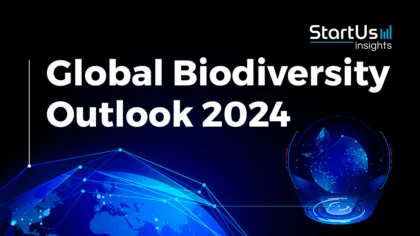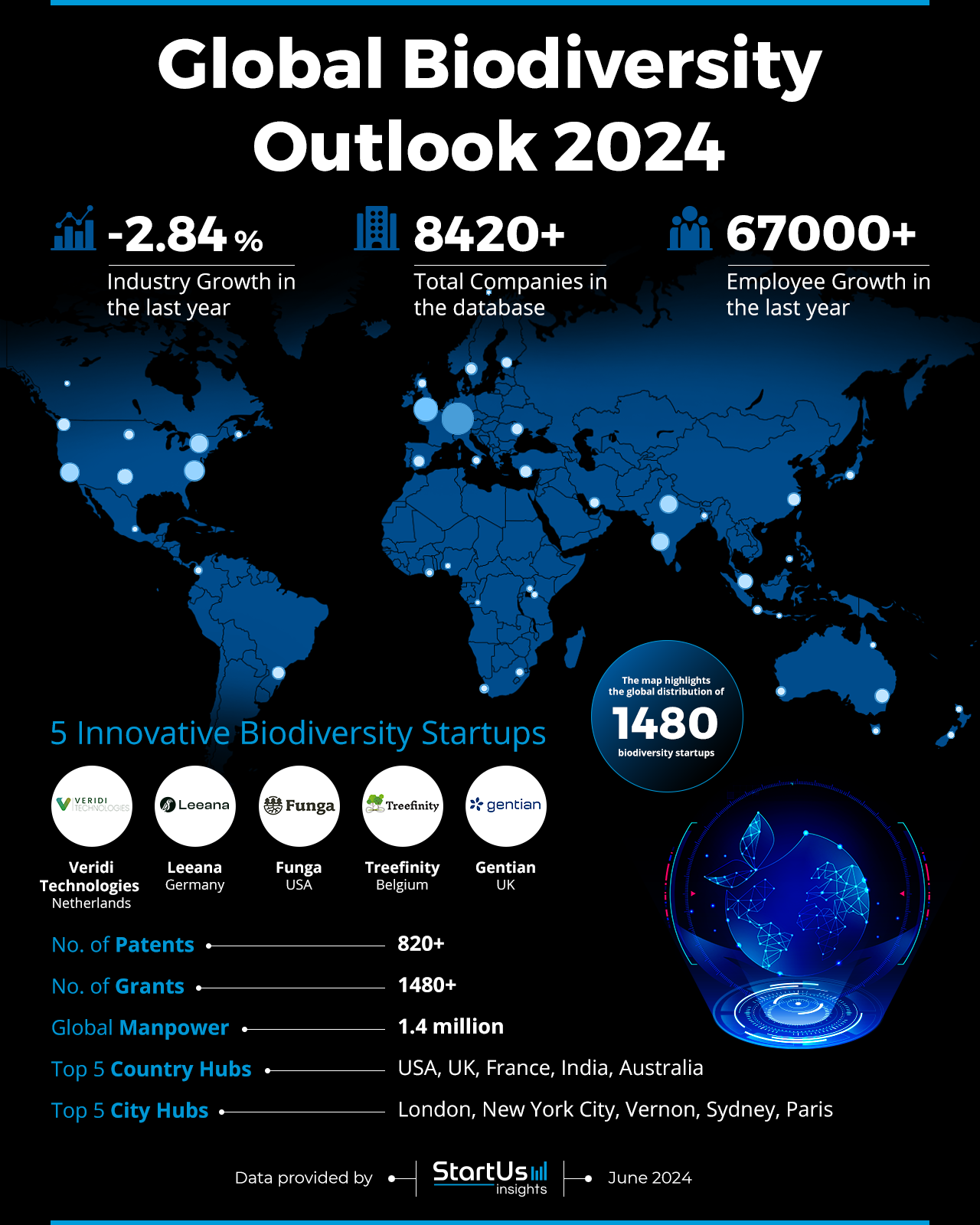The 2024 Biodiversity Report analyzes the current state and prospects of the biodiversity management and conservation sectors. This report covers key trends, significant growth areas, and the role of innovation in driving the industry forward. By examining the range of companies, investment activities, and the global workforce, the report highlights the range of solutions emerging in biodiversity adaptability. Also, it explores the contributions of top investors and showcases their confidence in the industry’s potential.
This biodiversity outlook serves as a reference for stakeholders within the industry, investors, policymakers, and economic analysts, providing a snapshot of the industry’s health to map its trajectory for innovation and growth in the coming years.
StartUs Insights Biodiversity Report 2024
- Executive Summary
- Introduction to the Biodiversity Report 2024
- What data is used in this Biodiversity Report?
- Snapshot of the Global Biodiversity Industry
- Funding Landscape in the Biodiversity Industry
- Who is Investing in Biodiversity Solutions?
- Emerging Trends in the Biodiversity Industry
- 5 Innovative Biodiversity Solutions
Executive Summary: Biodiversity Report 2024
This report is created using data obtained from the Big Data and AI-powered StartUs Insights Discovery Platform, covering more than 4.7 million global companies, as well as 20K+ technologies and emerging trends. We also analyzed a sample of 1400+ ecology restoration startups developing innovative solutions to present five examples from emerging biodiversity industry trends.
- Industry Growth Overview: The biodiversity industry comprises over 8420 companies and demonstrates its expansive nature. Despite a slight decline of -2.84% in annual growth, the sector remains innovative.
- Manpower & Employment Growth: The industry employs approximately 1 million individuals globally. In the past year, the workforce expanded by over 67K employees, indicating strong job market growth.
- Patents & Grants: More than 820 technologies in the industry registered for patents. Moreover, the industry secured more than 1480 grants and showcased its financial support for groundbreaking projects.
- Global Footprint: Major hubs include the USA, UK, France, India, and Australia. Key city hubs are London, New York City, Vernon, Sydney, and Paris highlighting the industry’s international reach and collaboration.
- Investment Landscape: The average investment value per funding round is USD 77 million. Over 830 investors participated in more than 2410 funding rounds, supporting over 900 companies.
- Top Investors: A few of the top investors who invested in the biodiversity industry include BMO Capital Markets, RBC Capital Markets, and General Atlantic. Combined, these top investors invested over USD 457 million in the industry.
- Startup Ecosystem: The top startups in this sector include Veridi Technologies (AI-powered soil microbiome analytics), Leeana (biodiversity impact management platform), Funga (forest fungal microbiome), Treefinity (plantlets creation), and Gentian (habitat mapping for biodiversity).
- Recommendations for Stakeholders: To ensure the continued growth and sustainability of the biodiversity industry, investors should prioritize investments in biodiversity-focused projects that enhance ecosystem restoration and conservation. Entrepreneurs and companies must encourage cross-border collaborations to drive innovation and share best practices in biodiversity management. Also, governments should develop and support policies that incentivize sustainable practices within the industry.
Explore the Data-driven Biodiversity Report for 2024
The Biodiversity Conservation Report 2024 uses data from the Discovery Platform and encapsulates the key metrics that underline the sector’s growth and innovation. The industry encompasses 1480 startups and a total of 8420 companies in the database. This network of businesses demonstrates the scale of innovation within the sector.
Despite experiencing a decline in industry growth of 2.84 % over the past year, technological advancement and research remain steadfast. This is evidenced by the number of 820+ patents filed and 1480+ grants awarded that highlight the sector’s dedication to leveraging new developments and securing financial support for groundbreaking projects.
Global manpower within the industry stands with the employment of about 1 million individuals worldwide. The past year alone saw a notable increase in the workforce, with an addition of 67K+ employees, and reflected the sector’s ongoing expansion and the increasing demand for skilled professionals.
Geographically, the industry’s growth concentrates in top country hubs such as the USA, UK, France, India, and Australia, with leading city hubs including London, New York City, Vernon, Sydney, and Paris. These regions serve as centers for innovation, collaboration, and economic activity and showcase the industry’s global footprint and its significant role in shaping the future.
What data is used to create this global biodiversity outlook?
Based on the data provided by our Discovery Platform, we observe that the biodiversity industry ranks among the top 5% in the following categories relative to all 20K topics in our database. These categories provide a comprehensive overview of the industry’s key metrics and inform the short-term future direction of the industry.
- News Coverage & Publications: The industry received media attention, with more than 17330+ publications in the last year.
- Funding Rounds: The sector closed more than 2410 funding rounds as recorded in our database.
- Manpower: The biodiversity sector showcases a workforce of over 1 million workers and added more than 67K+ new employees in the last year alone.
- Patents: Innovation is evidenced by 820+ patents filed within the industry.
- Grants: The industry also obtained financial support, with 1480+ grants awarded.
- Yearly Global Search Growth: Reflecting its growing relevance, the biodiversity industry experienced a 12.77% increase in yearly global search interest.
- and more. Contact us to explore all data points used to create this biodiversity report.
A Snapshot of the Global Biodiversity Industry
The industry demonstrates an expansive workforce and employs approximately 1 million individuals globally. This manpower highlights the sector’s scale and capacity. Additionally, the industry saw employee growth, with over 67K+ new employees joining in the last year alone. This surge in employment indicates an increasing job market and a growing demand for skilled professionals in the industry. With over 8420 companies operating within the sector, the industry’s footprint showcases a range of businesses and contributes to its growth and innovation.
Explore the Funding Landscape of the Biodiversity Industry
The investment landscape is equally impressive, with an average investment value of USD 77 million per funding round. The industry attracted several investors, exceeding 830+ individuals and entities. These investors participated in over 2410+ funding rounds, supporting over 900+ companies. This level of investment activity underscores the industry’s nature and the confidence investors have in its potential for future growth and innovation.
Who is Investing in Biodiversity Solutions?
The combined value injected by the top investors in the industry exceeds USD 457 million and illustrates the financial backing and confidence in the sector’s potential. Here is a detailed breakdown of the top investors and their contributions:
- MassChallenge backed 6 companies, with a total of USD 11K allocated.
- Techstars funded 6 companies, contributing USD 730K.
- Antler supported 4 companies, with investments totaling USD 561K.
- BMO Capital Markets financed 3 companies, with a substantial USD 172 million.
- General Atlantic contributed USD 80 million to 3 companies.
- Swig Finance endowed 3 companies with USD 336K.
- RBC Capital Markets funded 3 companies, with a significant USD 203 million.
- and more. Reach out to us to explore all investment data in the biodiversity industry
These investments reflect the financial and strategic interests of the investors. It also highlights the industry’s capacity to attract capital.
Access Top Biodiversity Innovations & Trends with the Discovery Platform
Carbon Sequestration has 874 companies actively working in this area. This trend employs 29500 individuals and added 5200 new employees in the last year to reflect the interest and investment in carbon capture technologies. Despite the challenges, the sector experienced an annual growth rate of 3.25%.
Climate Change Mitigation is used by 1292 companies to reduce greenhouse gas emissions and enhance resilience to climate impacts. This section of biodiversity employs 89300 individuals and saw an increase with 7800 new employees joining in the past year. The annual trend growth rate stands at 11.68%.
Greentech is represented by 2053 companies focusing on developing environmentally friendly technologies. This field employs 101500 individuals and added 8800 new employees in the last year. However, it faced a slight annual decline with a growth rate of -0.77%.
5 Top Examples from 1400+ Innovative Biodiversity Startups
The five innovative startups showcased below are picked based on data including the trend they operate within and their relevance, founding year, funding status, and more. Get in touch to find promising startups, emerging trends, or industry data specific to your company’s needs and objectives.
Veridi Technologies provides AI-powered Soil Microbiome Analytics
Netherlands-based startup Veridi Technologies offers AI-powered soil microbiome analytics for diagnosing plant pathogens and analyzing soil biodiversity. Its platform combines optics, precision mechatronics, deep learning, and cloud computing to automate manual laboratory work. Further, it utilizes computer vision and automated microscopy to optimize laboratory diagnostics workflows and achieve significant cost savings. Also, the startup targets plant parasitic nematodes to expand to environmental nematodes as these nematodes serve as indicators of soil biodiversity.
Leeana develops a Biodiversity Impact Management Platform
German startup Leeana develops a platform for managing corporate biodiversity impact to identify biodiversity footprint and reduce environmental impact. The platform provides insights into corporate nature footprints using scientific biodiversity data and satellite imagery. Moreover, Leeana’s platform allows for near real-time high-resolution biodiversity data to assist with risk management and mitigation strategies.
Funga utilizes Forest Fungal Microbiome Networks
US-based startup Funga uses forest fungal networks to address the climate crisis and enhance forestry outcomes. The startup utilizes modern DNA sequencing and machine learning technology to analyze the forest microbiome. It places native, biodiverse communities of mycorrhizal fungi in optimal locations to promote faster growth of high-quality wood, increased carbon sequestration, and more resilient forests. The integration of these technologies leads to improved soil and plant health and supports overall forest biodiversity.
Treefinity creates Plantlets in the Lab
Belgian startup Treefinity provides plantlets derived from varieties of adult trees. The startup converts tissues and cells from mature trees into planting materials using technologies such as AI and machine learning. The process begins with obtaining a small tissue sample from a mature plant. This sample undergoes proliferation, where more than 100 cells are generated through the application of an inducing agent. This approach enhances forestry initiatives and prioritizes biodiversity preservation.
Gentian provides Habitat Mapping for Biodiversity Management
UK-based startup Gentian offers precision monitoring through biodiversity maps and reports utilizing satellite imagery and AI. The startup first maps out the specific area of interest on the platform. It then employs satellite imagery of the designated area and runs it through AI models to automatically identify habitats, trees, green roofs, and vegetation coverage. The data undergoes a quality assurance process to ensure the highest level of accuracy. This technology assists municipalities, state agencies, large corporations, landowners, and ecologists.
Gain Comprehensive Insights into Biodiversity Trends, Startups, or Technologies
The 2024 Biodiversity Industry Report shows a sector facing global challenges such as habitat loss, climate change, and limited funding for conservation efforts. With increasing investment activity, a growing workforce, and significant innovation, the industry looks forward to continued growth with innovative technologies like AI-driven satellite imagery, advanced DNA sequencing, and conservation projects. Get in touch to explore all 1400+ startups and scaleups, as well as all industry trends impacting each biodiversity initiative.










